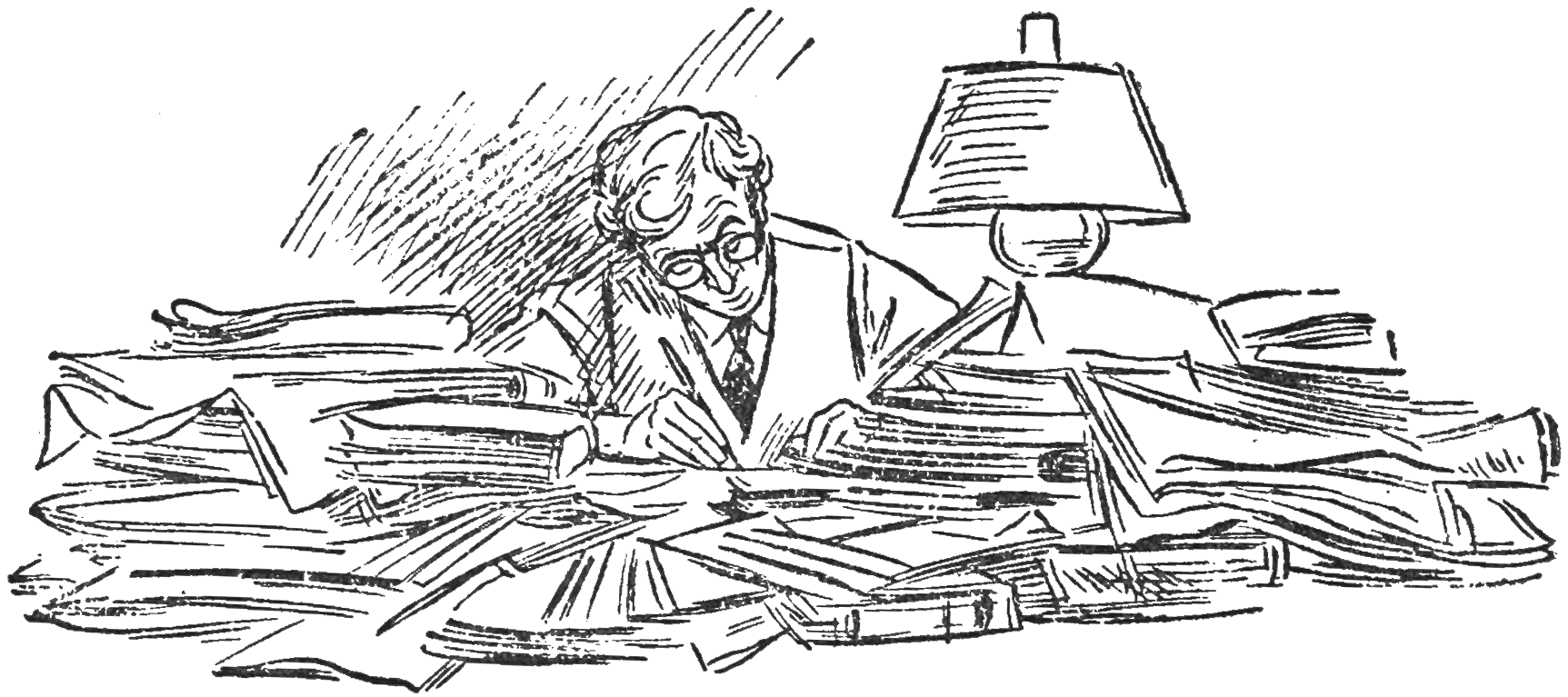
THE FUN OF WRITING
ON THE way to the station this warm / chilly morning
[Note to Linotype Man: Please kill the inappropriate adjective; we like to be accurate, and this April weather is so inconstant] we were thinking how little appreciated is the true pleasure of writing.
Writing is an art (or, if you prefer, a trade) never wholly and properly enjoyed except by the intensely indolent. What we mean is this: there are a lot of things in life that are not at all as they should be. But the writer, by magnificent pretence, improves all that. Gardening, for instance. No one enjoys seeing beds thickly decorated with bright flowers and superb vegetables more than we do. But the grubby and tiresome task of groping about with trowels and quicklime and all the other fertilizers is distasteful. Getting sweet peas to climb is a noxious business. Somehow the seedsman always palms off on us a kind of horizontal sweet pea that runs lowly along the ground and never blossoms at all. But take up the pen, or typewriter, and how quickly everything is rectified. When you set to work to compose a story, how easy it is to have things nice and genteel. Thus:
Out in the bland freshness of the suburban morning, Mr. Frogbones was enjoying his garden. In twin beds under the tall French windows the gardenias and sunflowers were just opening towards the violent orb. Sweet peas and daffodils and vast claret-coloured roses aspired upon a green trellis. “How I love a little nosegay,” he said, as he clipped off a couple of dozen of the great cider-tinted chrysanthemums, and bore them indoors to his wife. In the breakfast room a well-trained maid servant was putting the fragrant coffee on the table and the children were drinking their morning milk with neatness and gusto. “Elise,” said Mrs. Frogbones to the maid, “you may bring in the sausages, kidneys, bacon, scrambled eggs, anchovy toast, marmalade, grape fruit, porridge, raisin bread, and gooseberry jam. Mr. Frogbones is ready for breakfast.”
Now what could be easier, what could be more agreeable, than to write that? And yet not a word of it is true. We know Henry Frogbones well: his garden is contemptible; the maid’s coffee is execrable, and she is going to leave at the end of the week anyway; his children roar with anguish when they see a mug of milk, which they detest. But how pleasant it is to lend a hand to the travailing universe when you are writing.
As Henry Frogbones finished his ample breakfast the large absinthe-coloured limousine rolled with a quiet crunch across the terrace which was pebbled with small blue gravel. He slipped on his new herringbone surtout, lit a fine black cheroot, hitched up one spat which had got twisted, and rolled away to town. Ambrose, the chauffeur, was accustomed to his employer’s ways: he drove gently so that Mr. Frogbones could read the morning paper with comfort. After an hour’s ride through exquisite scenery [if the editor pays more than five cents a word, it may be well to describe this scenery] Mr. Frogbones reached his office, where the morning mail had already been opened and classified by a competent assistant. In the anteroom a number of callers were waiting, held in check by a respectful young man who was explaining to them that no one can possibly disturb Mr. Frogbones until his morning article is written....
As a matter of fact, we don’t feel that we can go on with this any further; it is beginning to seem too unlikely. But it only seems unlikely to us, because we know the truth about old Frogbones. The average magazine reader would swallow it without cavil. That is why we say that writing is huge fun, because you can solve all the perplexities and distractions of life as you go along, and really enjoy yourself at the same time, and (most remarkable of all) get paid for it.




